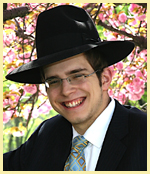True Happiness
[Editor’s note: As a memory of my beloved brother Shaya, I would like to continue sending out his pearls of wisdom that he has shared with all of you in the past. For some of you this may ring a bell and for others it may appear to be totally new. May the learning of Shaya’s Divrei Torah inspire us to change our ways and thereby give an Aliya to the neshama of our dear beloved Shaya whom we miss so much. A special thank you to Aaron Friedman for always looking over the divrei torah.]
Editor’s Note: Succos is called Zman Simchaseinu, a time of rejoicing and happiness. Succos is also known as the Chag Hasif- the holiday of gathering. Succos was the time that farmers would have all their crops gathered in the granary after many months of working in the field toiling in the soil, cultivating the ground, watering the seeds, etc. They would then harvest the field and eventually bring it to the granary. We can certainly imagine how happy and proud the farmer was with the final product after months and months of work.
Is that what we are so happy about over Succos, that we have so much grain in our granary? While a person may be happy with all the grain he has amassed in his granary, as well as his efforts put forth to achieve his goal, is that all the farmer has to rejoice over? It seems inappropriate that we would repeat the words ‘zman simchaseinu’ over and over again in Shemoneh Esray and in bentching and it only be referring to the material wealth one has accumulated over the year, but not our happiness on a spiritual level.
I would like to propose that ‘zman simchaseinu’ has a slightly deeper meaning, and it is called zman simchaseinu because once a person has a full granary, he is supposed to reflect on all the blessings that Hashem has given him that year. All the rain and sunshine that produced such a great crop. Perhaps after a person starts to reflect on that, he will reflect on all the other blessings that Hashem has given him: his family, roof over his shoulders, etc. When he thinks about all that, he will be truly happy, realizing that he is completely in Hashem’s hands.
Perhaps this is another idea that we are celebrating this Yom Tov. We are celebrating all the many blessings that Hashem has bestowed upon us over the past year. This year was an especially tough year. With COVID-19 affecting the world at both a global and personal level, it was challenging for everyone. With that said, there were plenty of blessings in the year as well. There is so much to be thankful to Hashem for. For those of us who have not gotten sick, we must thank Hashem for that. For those of us who have not lost our jobs, we must thank Hashem for that. Every person was tested with a challenge that was tailor-made for him or her. We must look above and beyond all of our suffering and recognize all the good that Hashem has bestowed upon us amidst this pandemic.
I think that this idea culminates and rolls right into Shemini Atzeres and Simchas Torah. Once we count our many blessings in life and realize how much good Hashem has and continues to give is, we realize that Hashem loves us so much, and he gave us all the Mitzvahs to help us become better people.
Perhaps that is another reason why we dance on Simcha Torah with the Torah, because we are so happy and thankful to Hashem for everything He gives us, and we express our gratitude it by singing and dancing with Hashem’s Torah, and we celebrate all the many blessings in life that Hashem has given us.
May we be inscribed this year with all the many blessings that Hashem can possibly bestow on us, and may we merit the ultimate redemption with Moshiach and the rebuilding of the Beis Hamikdash very soon. |





